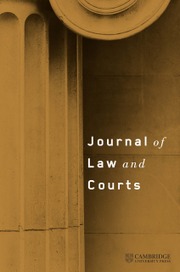Article contents
Strategic Opinion Language on the US Courts of Appeals
Published online by Cambridge University Press: 21 October 2022
Abstract
What strategies do judges employ when they anticipate review? Constrained judges behave strategically by using particular instruments—like language complexity—when authoring opinions. Prior studies suggest that judges use complexity in anticipation of legislative hostility. Similarly, the threat of review and reversal may spur opinion complexity. This study examines variations in circuit court opinions resulting from precedent treatment and Supreme Court preferences. When a circuit negatively treats a Supreme Court precedent that the justices prefer or a circuit positively treats a precedent that the justices dislike, opinion complexity should increase. These hypotheses find support, suggesting that circuits strategically insulate using opinion complexity.
- Type
- Research Article
- Information
- Copyright
- © 2020 by the Law and Courts Organized Section of the American Political Science Association. All rights reserved.
Footnotes
I am sincerely thankful to James Spriggs, Lee Epstein, Matthew Gabel, Alice Sanford, Betsy Sinclair, Margit Tavits, Kevin McGuire, David Carlson, JB Duck-Mayr, Dino Hadzic, Jonathan Homola, Jae Hee Jung, Elif Ozdemir, Andrew Stone, Michelle Torres, Nicholas Waterbury, and the anonymous reviewers, among others, whose thoughtful comments have significantly improved this manuscript. Furthermore, I am grateful for the comments I received from conference discussants and attendees including Eileen Braman, Micheal Giles, Erin Lauterbach, Ali Masood, Josh Ryan, Jacqueline Sievert, Gisela Sin, Steve Wasby, and Cara Wong. I presented previous versions of this article at the 2017 Midwest Political Science Association Annual Meeting, the 2017 PoliInformatics Workshop, the 2018 Washington University in St. Louis–University of Illinois Student Exchange, and the 2018 American Political Science Association Annual Meeting.
References
- 2
- Cited by


